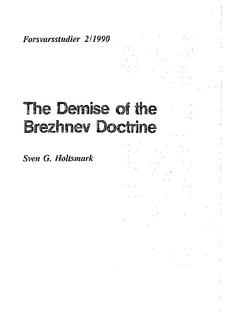| dc.description | Following the Warsaw Pact invasion of Czechoslovakia on 21 August 1968, the Soviet bloc entered into a period of strictly limited tolerance to deviations from the Soviet model of socialism. The theory of "socialist international relations" became the theoretical rationalization of the new drive for bloc unity. Since the late 1970s, howeveer, the collapse of economic and political stability in Eastern Europe and the Soviet Union itself undermined the whole consept of chesion in the bloc.
This study examines the evolution of Soviet thinking on Soviet East European relations from 1968 to late 1989, and discusses the role of the "theory" for relations between socialist states. From the early 1980s, the Soviets were forced to adjust their thinking to keep pace with developments in Eastern Europe. DUring 1989 the "theory" finally disappeared as a Soviet foreign policy instrument. | en_US |
